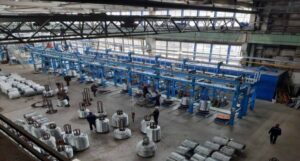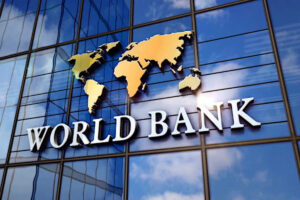
Dneprometiz-TAS LLC (Dnipro), owned by Ukrainian businessman Sergiy Tigipko, is to provide UAH 208 million to the TAS Group Association of Companies for their financial support on a repayable basis.
According to the company’s announcement in the NSSMC’s information disclosure system, the decision to grant consent to the company’s significant transaction was made by the supervisory board). Dneprometiz-TAS LLC on February 19, 2025.
It is specified that the subject of the transaction is the temporary attraction of funds for financial support of other members of the Association of TAS Group Companies on the following terms: the amount of funds temporarily attracted by the Association from Dneprometiz-TAS LLC is UAH 208 million. The funds are to be repaid within 15 calendar days from the date of receipt by the Association of the relevant request of Dneprometiz-TAS LLC for such repayment.
The funds are raised on a free (interest-free) basis and provided by wire transfer within ten days from the date of the relevant agreement.
“Dneprometiz-TAS produces hardware products from low-carbon steels. The company’s capacity is 120 thousand tons of products per year.
The company is owned by T.A.S. Overseas Investments Limited (Cyprus) owns 98.6578 percent of Dneprometiz LLC.
The authorized capital of Dneprometiz-TAS LLC is UAH 83.480 million.
Number of unemployed in Ukraine and job opportunities, 2023-2024

Source: Open4Business.com.ua

Information and analytical center Experts Club analyzed the data of the International Monetary Fund (IMF) on the external debts of states and their ratio to the GDP of states. The video is available on the Experts Club YouTube channel. In 2023, the leader in terms of public debt to GDP was Sudan – its figure reached 252%. This is due to the economic crisis, the consequences of the armed conflict and hyperinflation.
In second place is Japan (206%), which traditionally holds a high debt burden due to large-scale government borrowing and debt financing of the budget.
Third place went to Lebanon (195%), whose economy continues to suffer from the effects of the financial crisis, corruption and political instability.
Further down in the ranking are:
4. Greece – 185%
5. Singapore – 177%
6. Argentina – 155%
7. Italy – 132%
8. Zambia – 127%
9. Bahrain – 123%
10. Maldives – 123%
11. Bhutan – 116%
12. Laos – 116%
13. Cape Verde – 114%
14. Barbados – 113%
15. USA – 112%
16. Cyprus – 112%
17. Portugal – 105%
18. Great Britain – 101%
19. Dominica – 100%
20. Republic of Congo – 99%

Maxim Urakin, founder of the information and analytical center Experts Club, PhD in Economics, said that a high level of public debt in relation to GDP is a serious challenge for the economy of any country.
“In some cases, such as Sudan or Lebanon, this is a consequence of structural crises, armed conflicts, and political instability. At the same time, countries such as Japan and Singapore, despite their high debt ratios, have sustainable economic models that allow them to effectively manage their financial obligations. It is crucial for Ukraine to find a balance between attracting external financing and ensuring economic sustainability to avoid a debt trap and excessive dependence on creditors,” Urakin said.
As of 2023, Ukraine’s external debt totaled $132.4 billion and its ratio to GDP was 87%. Ukraine is not among the top 20 countries with the highest debt-to-GDP ratio, but ranks high among countries with large government liabilities.
In terms of absolute debt, Ukraine is about 30th in the world, but due to the military conflict and the need for external financing, this indicator continues to grow.
If the situation does not stabilize, further growth of the debt burden is predicted, which may lead to difficulties in debt servicing and increased dependence on international creditors.
Video analysis is available at the link – https://www.youtube.com/shorts/oT_5cTOnM8k

Exit polls conducted after the parliamentary elections in Germany indicate the victory of the CDU/CSU opposition bloc, Bild reported on its Telegram channel on Sunday. The leader of the race was the CDU/CSU party led by Friedrich Merz, which, according to exit polls, received 29% of the vote. This means that Merz will become the new chancellor.
“Compared to the 2021 elections, the Christian Democrats have significantly strengthened their position,” Bild writes.
The second place, according to the polls, was taken by the Alternative for Germany (AfD), which almost doubled its previous result, gaining about 19%.
“However, despite its success, it will remain in opposition, as other parties are not ready to cooperate with it,” Bild notes.
The Social Democratic Party (SPD) under the leadership of Olaf Scholz suffered a catastrophic defeat, receiving only 16% of the vote – the worst result in 135 years. The Greens (about 13%) and the Free Democratic Party (FDP), which is teetering on the brink of entering parliament, also suffered serious losses.
Bild calls the return of the Left party “unexpected”, which, despite weakening after the departure of Sarah Wagenknecht, managed to overcome the 5% threshold and gain about 8%. At the same time, the BSW movement, founded by Wagenknecht, stopped at around 5%: it is still unclear whether the party will get into the Bundestag or not.
Now the main question is who will join the ruling coalition. So far, an alliance of the CDU/CSU with the SPD seems to be a possible option, as the Conservatives and the Greens may not have enough votes.
“We can expect certainty in the coming weeks, when negotiations on the formation of a new government begin,” Bild observers note. Information and analytical center Experts Club and Active Group have previously released a video analysis of the most important elections in the world in 2025, more details in the video review – https://youtu.be/u1NMbFCCRx0?si=-rc6YHH7EA1pnr7w

UN Secretary-General António Guterres, on the third anniversary of Russia’s full-scale invasion of Ukraine, emphasized the need for a just peace.
“At a time of this tragic event, I reaffirm the urgent need for a just, sustainable and comprehensive peace – one that fully upholds Ukraine’s sovereignty, independence and territorial integrity within its internationally recognized borders, in accordance with the UN Charter, international law and General Assembly resolutions,” Guterres wrote on social media X on Sunday.
He emphasized that from the very first day of the war, the UN has shown full solidarity with the people of Ukraine, providing vital humanitarian assistance and supporting long-term recovery and reconstruction efforts.
“The war in Ukraine poses a serious threat not only to the peace and security of Europe, but also to the very foundations and basic principles of the UN. Enough is enough. After three years of death and destruction, I call again for urgent de-escalation and an immediate cessation of hostilities. I welcome all efforts to achieve a just and inclusive peace. The UN stands ready to support such efforts,” he summarized.

On Monday, February 24, in the center of Kiev will temporarily restrict traffic and parking, and public transport will change routes, reports the Kiev city state administration.
“In particular, the Maidan Nezalezhnosti metro station will not work for entry and exit for passengers from 7:00 to 11:00. At the same time, the interchange junction “Maidan Nezalezhnosti” – “Khreshchatyk” will work in the usual mode”, – is indicated in the message in the telegram channel.
Also from the beginning of the movement and tentatively until 19:00 ground passenger transport will run with temporary changes. Thus, trolleybus № 6 will move from Minsk massif to Lukyanivska metro station, trolleybus № 18 – from Soshenko Street to Vozdukhoflotsky overpass, buses № 110, 111, 114 – respectively from Miloslavskaya Street and Darnitskaya Square to European Square, bus № 62 – on the sites Kontraktova Square – European Square and Botanical Garden – Bessarabskaya Square.
“According to the National Police of Ukraine, temporary restrictions on traffic and parking will be in effect in the central part of the city in Pechersk and Shevchenko districts. Temporary changes are associated with the state-level celebration of the third anniversary of the beginning of the full-scale invasion of Russia on the territory of Ukraine”, – added in the KSCA.